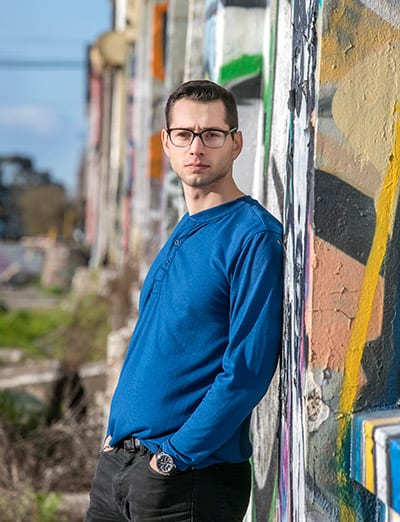
 Zachariah Oquenda ’19
Zachariah Oquenda ’19
It’s an under-told story: 14 percent of America’s homeless population can be found in rural areas, according to the Annual Homeless Assessment Report.
For a time that included Zachariah Oquenda ’19, who lived in a campground in Marseilles, Illinois, with his parents and six siblings.
“Rural homelessness looks different than urban homelessness,” he says. “People usually don’t sleep on the streets. For my family, it was living in a tent. Or you move in with another family because there’s no shelter in rural areas.”
Oquenda hopes to galvanize awareness of the problem and provide hope for rural communities, where the homeless often lack access to health care and social services. He plans to practice housing law. “Given my socioeconomic background, I want to change laws across the board to give more access and equity to families who otherwise wouldn’t have it,” Oquenda says.
At Berkeley Law, he has drawn on personal experiences while helping low-income employees recover unpaid wages through the Wage Claims Clinic and helping low-income area residents secure housing and other necessities through the Tenants’ Rights Workshop. During the school year, he logged about 140 pro bono hours.
Oquenda says his family was unjustly evicted from one home and moved into substandard housing in Illinois (“it didn’t have proper insulation, the kitchen floor was bowed, the central heating didn’t work, and we often didn’t have electricity or running water”), forcing the campground move.
After brushes with the law growing up, he figured his future “was either a hard-labor job, the military, or prison.” He has since found a softer side: Oquenda is a salsa ballroom dancing enthusiast who is learning East and West Coast swing with his fiancée, April. He also started a lock-picking club in college after he locked himself out of his dorm room and campus police charged $25 to open the door. More than 60 students joined the group—for lawful purposes.
Oquenda left Illinois at 17, moving to California to live with grandparents he didn’t know. The arrangement didn’t work out, but his high school rallied behind him, finding him a room with a retiree.
He gained admission to Claremont McKenna College, where he won a $30,000 Truman Scholarship (payable toward his legal education) for his work to secure more financial, academic, and institutional support on behalf of first-generation, low-income students.
“I always felt like I had something that I needed to prove, to compensate for, because we weren’t as well off as other families,” Oquenda says. “School has been a haven for me.”
—Andrew Faught